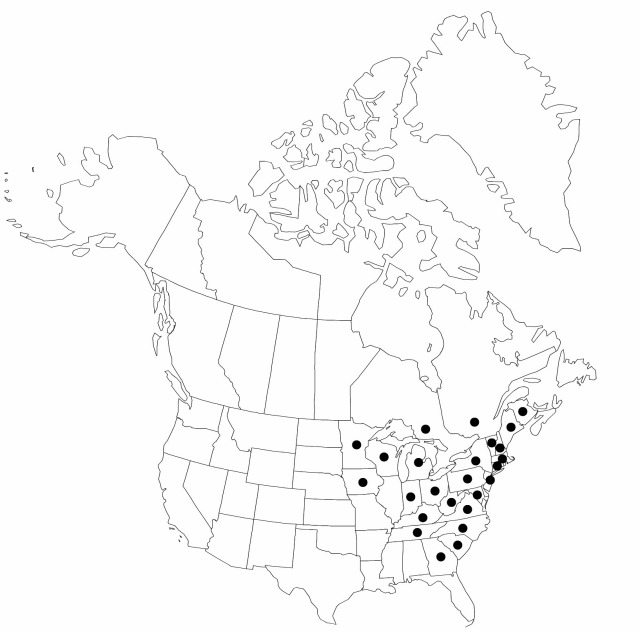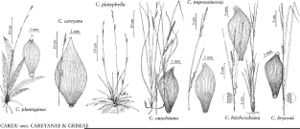Carex plantaginea
in J. Lamarck et al., Encycl. 3: 392. 1789.
Plants densely cespitose. Culms lateral, erect or ascending, usually overtopping vegetative shoots, 24–54 cm × 0.7–1 mm. Leaves: basal sheaths purple, 7–18 mm; blades erect or ascending, evergreen, midrib and 2 lateral-veins strongly developed, 14–42 cm × 8–32 mm, older leaves often shriveling or dead at tips. Inflorescences: spikes 3–5 per culm, scattered; peduncle of pistillate spikes erect or spreading, rarely drooping, exserted 0–18 mm; bracts from middle and proximal portions of culms reduced, 0.8–2 cm × 2–3.5 mm. Pistillate spikes the proximal basal, 8–30 × 4–7 mm. Staminate spike 1, pedunculate, oblanceolate to linear, 8–20 × 2–3.5 mm. Pistillate scales slightly keeled, 3.2–4.2 × 1.8–2.2 mm, midribs green, margins hyaline with purple outward, apex cuspidate to acuminate to acute. Staminate scales 3–6 × 1.5–2 mm, midveins green or purple, margins dark purple, apex obtuse. Anthers 3.2–4.2 mm. Perigynia (4–) 9–13 (–15) per spike, overlapping, finely veined, elliptic, 3.7–4.9 × 1.6–2 mm; beak constricted. Achenes ovoid, 2.2–2.7 × 1.5–1.9 mm, sides flat to slightly concave at maturity, tightly fitting in perigynia. Style ascending from achene through entire orifice. 2n = 50, 52.
Phenology: Fruiting spring.
Habitat: Rich, moist, deciduous or mixed deciduous-evergreen forests, on slopes along streams or along edges of moist depressions, southward in mountain gorges
Elevation: 100–600 m
Distribution

N.B., Ont., Que., Conn., Ga., Ind., Iowa, Ky., Maine, Md., Mass., Mich., Minn., N.H., N.J., N.Y., N.C., Ohio, Pa., S.C., Tenn., Vt., Va., W.Va., Wis.
Discussion
Selected References
None.
Lower Taxa
"shortened" is not a number."wide" is not a number.
